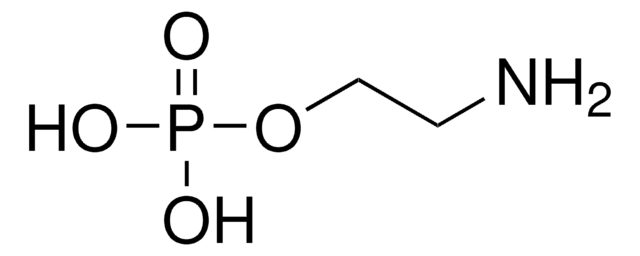E6133
Ethanolamine hydrochloride
≥99.0%
Sinónimos:
mea hydrochloride, monoethanolamine hydrochloride, 2-Aminoethanol hydrochloride
About This Item
Productos recomendados
Quality Level
assay
≥99.0%
form
powder or crystals
storage condition
dry at room temperature
technique(s)
HPLC: suitable
color
white
pH
9—10
pKa (25 °C)
9.5
mp
82-84 °C (lit.)
solubility
water: 0.33 g/mL, clear, colorless to very faintly yellow
density
1.07 g/cm3 at 20—25 °C
1.12 g/cm3 at 20—25 °C
suitability
suitable for chromatography
application(s)
general analytical
life science and biopharma
pharmaceutical
SMILES string
NCCO.[H]Cl
InChI
1S/C2H7NO.ClH/c3-1-2-4;/h4H,1-3H2;1H
InChI key
PMUNIMVZCACZBB-UHFFFAOYSA-N
¿Está buscando productos similares? Visita Guía de comparación de productos
Categorías relacionadas
General description
Application
- in overnight incubation of the tips to attach primary amine groups at the tip surface
- in the preparation of DMEM (dulbecco′s modified eagle′s medium)/F-12 media to culture human epidermal growth factor receptor 2 (HER2) cells derived from MMTV-HER2 transgenic mouse mammary tumors
- to administer the cultures to study its effect on the endogenous phosphatidyl ethanolamine pool and autophagy process
- in a study as a reagent to study molecular interactions and adhesion forces in biological systems using Atomic Force Microscopy
- to prepare the reagent for surface-enhanced laser desorption ionization analysis, aimed at studying the role of Interleukins
Biochem/physiol Actions
Features and Benefits
- Suitable for Immunology, Cellular Biology and Biochemical Research
- Tested to confirm low levels of heavy metal contamination, ensuring suitability for various applications
- Effective Buffering Agent with a pKa of 9.5 (25 °C)
Other Notes
Comparable product
signalword
Warning
Hazard Classifications
Acute Tox. 4 Dermal - Acute Tox. 4 Inhalation - Acute Tox. 4 Oral - Aquatic Chronic 3 - Eye Irrit. 2 - Skin Irrit. 2 - STOT SE 3
target_organs
Respiratory system
Storage Class
11 - Combustible Solids
wgk_germany
WGK 1
flash_point_f
Not applicable
flash_point_c
Not applicable
ppe
dust mask type N95 (US), Eyeshields, Gloves
Elija entre una de las versiones más recientes:
¿Ya tiene este producto?
Encuentre la documentación para los productos que ha comprado recientemente en la Biblioteca de documentos.
Los clientes también vieron
Nuestro equipo de científicos tiene experiencia en todas las áreas de investigación: Ciencias de la vida, Ciencia de los materiales, Síntesis química, Cromatografía, Analítica y muchas otras.
Póngase en contacto con el Servicio técnico




